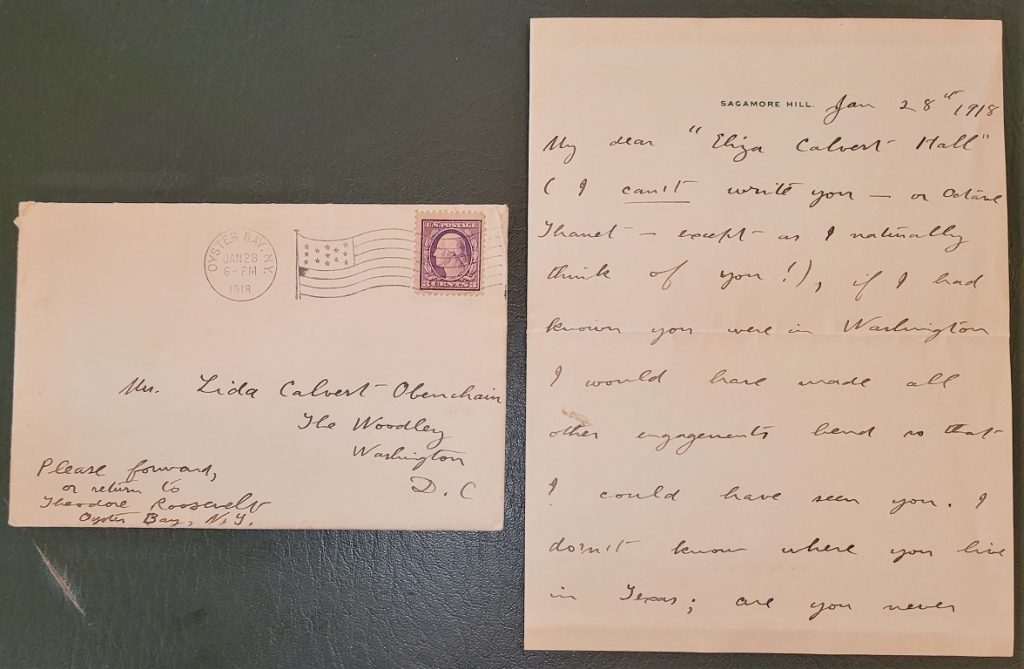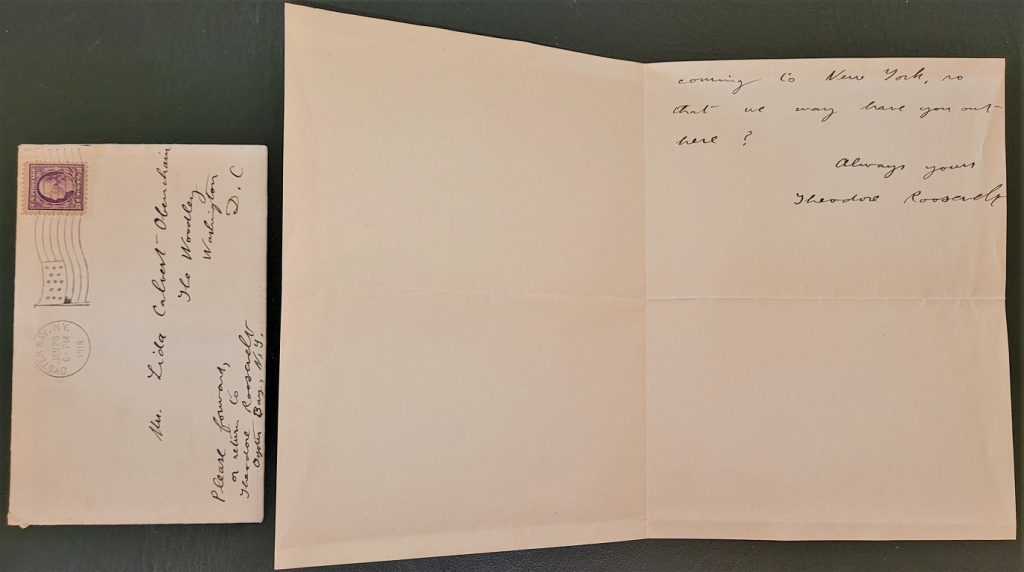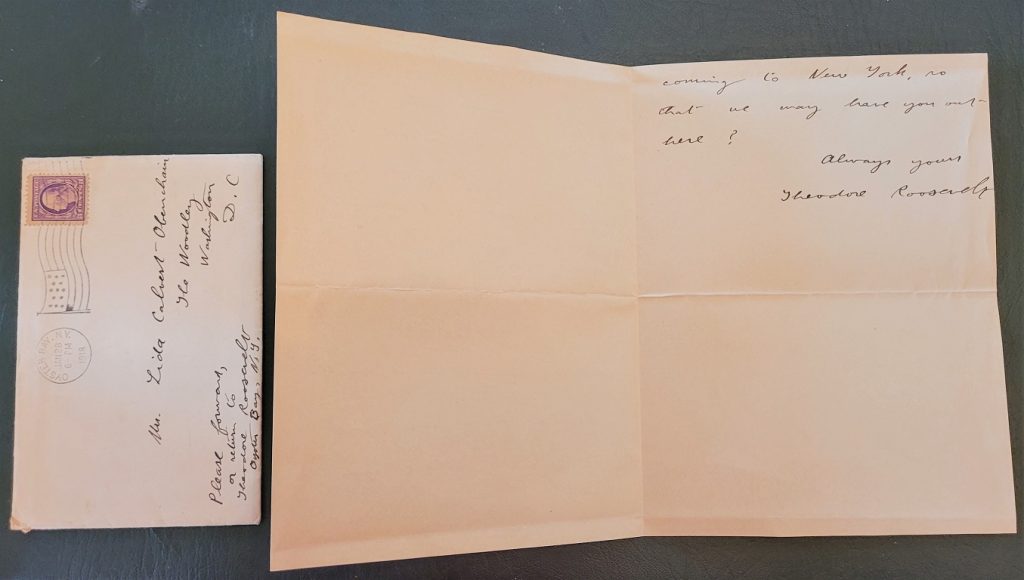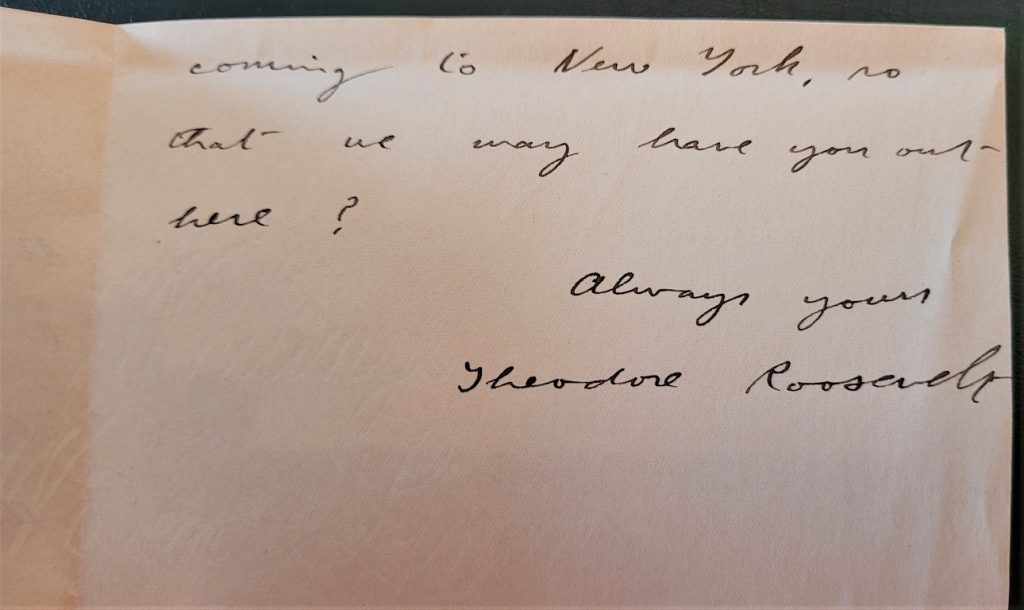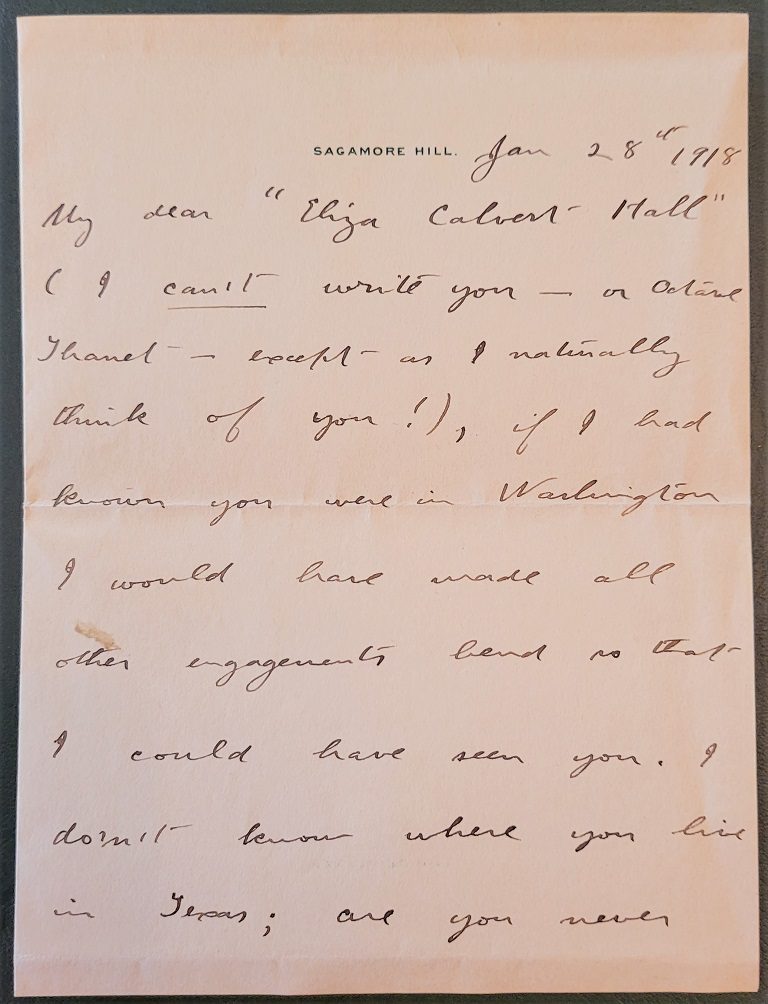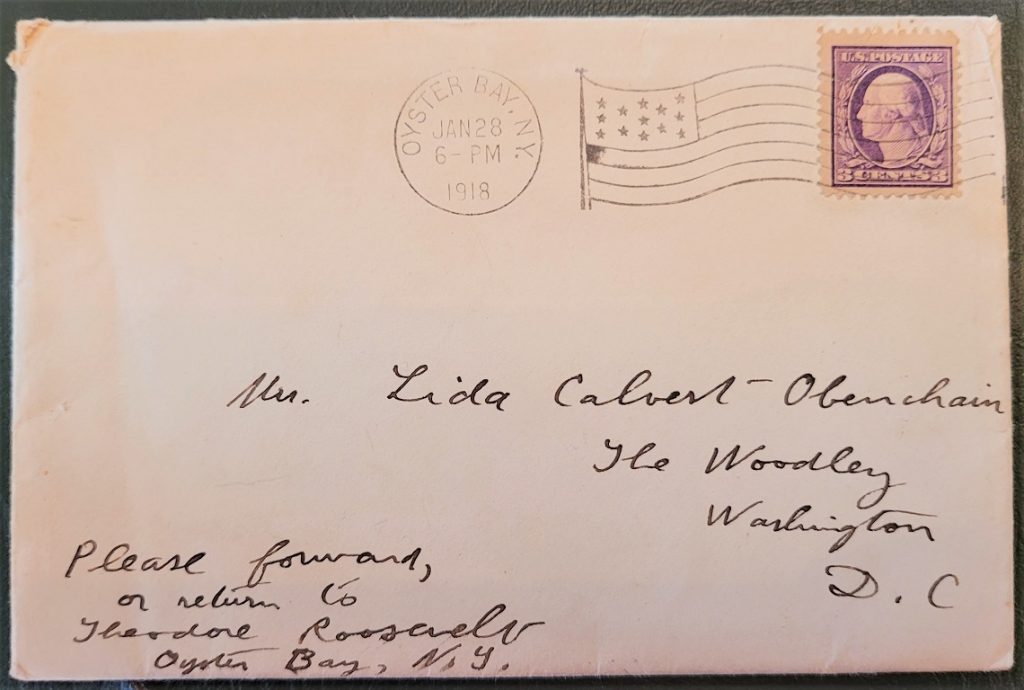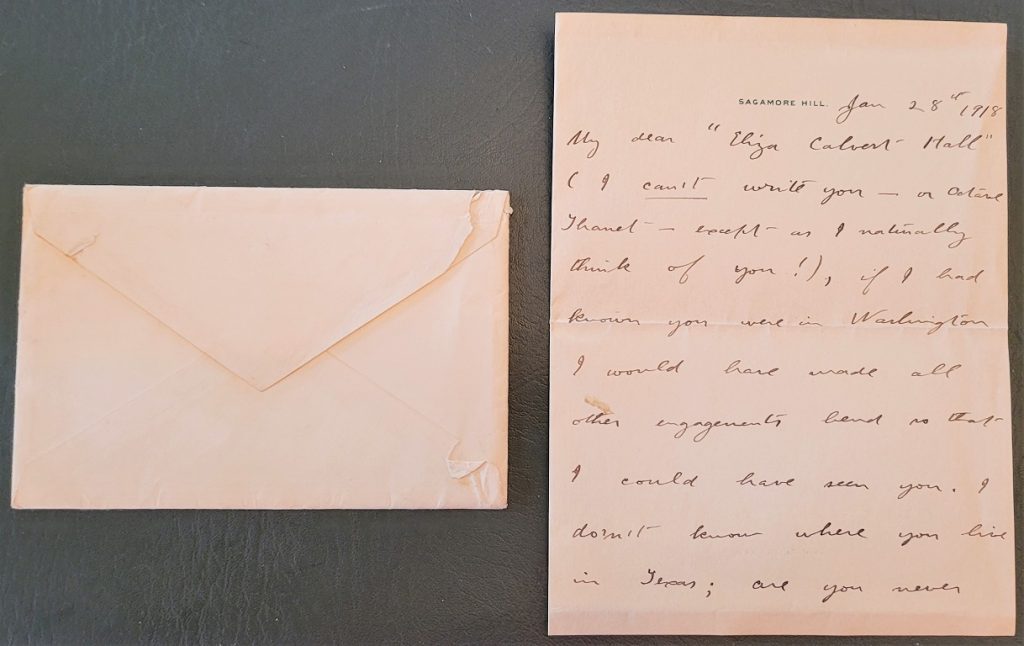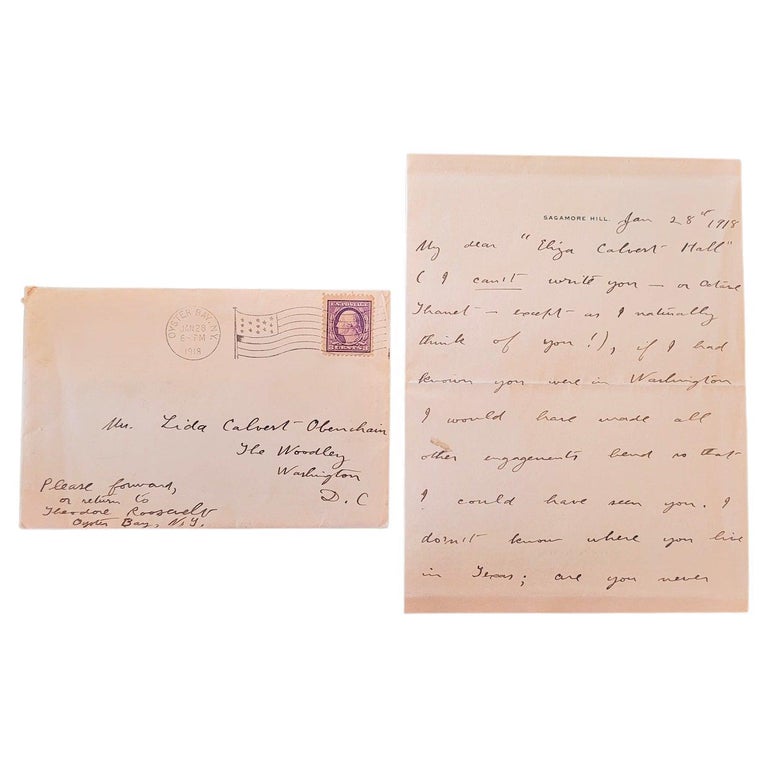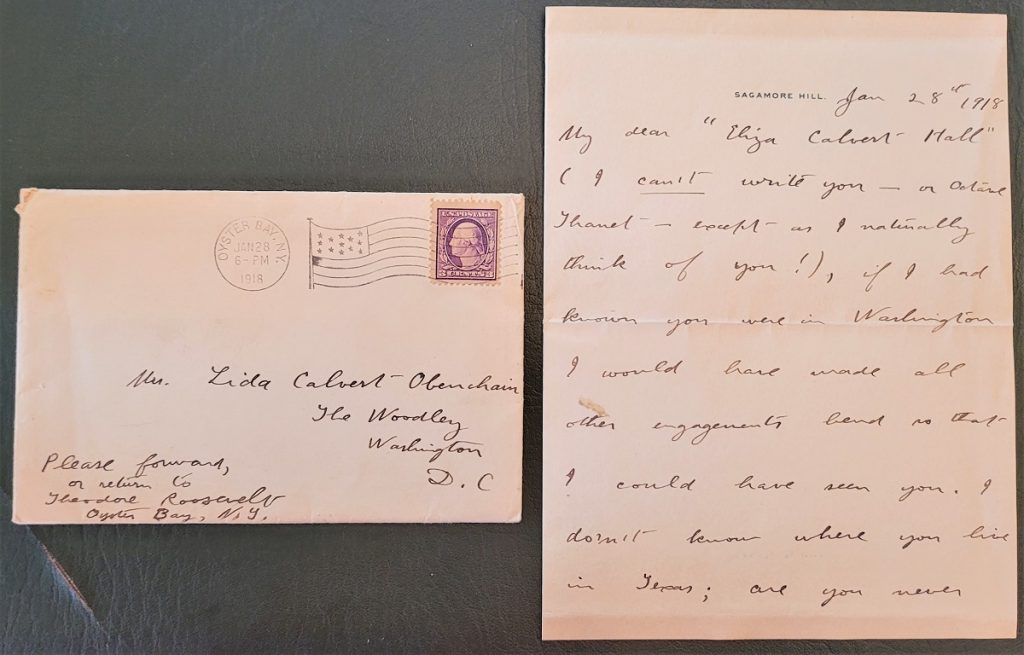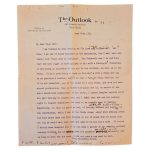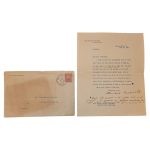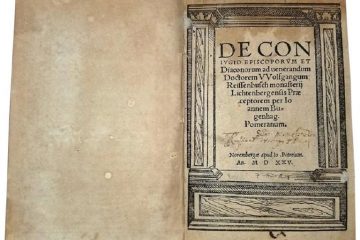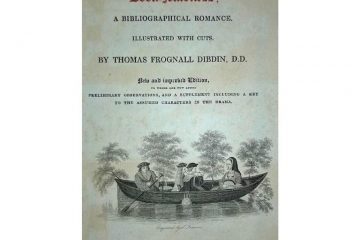Important Teddy Roosevelt Letter of January 1918
PRESENTING AN EXCEPTIONALLY RARE and FULLY AUTHENTIC Teddy Roosevelt Letter of January 1918.
On ‘Sagamore Hill’ letterhead. Fully handwritten and personally signed by President Theodore Roosevelt.
Dated January 28th 1918.
With it’s original envelope, stamp and postage marks.
What makes this letter so important is the author, the office and the content.
It is addressed to Eliza Calvert Hall/Obenchain who was a well known author at the end of the 19th Century and Early 20th Century. In 1905, Teddy referred to her book “Aunt Jane of Kentucky’, in a speech and recommended that every man in America should read it to understand ‘the plight of their womenfolk’. He regularly corresponded with her and we have a number of those letters in our collection. It appears that both he and Edith became big fans of Mrs Hall/Obenchain who was also heavily involved in the Suffragist movement.
The letters also provide a fascinating and historic record of Roosevelt’s personal beliefs and feelings on female empowerment.
This letter reveals Teddy’s desire to meet the author in New York and refers to another important female author of the time, Alice French (Octave Thanet).
The letter is a folded double folio with writing on the outside and inside fold.
The Letter Reads:
Sagamore Hill
Jan 28th, 1918
“My dear “Eliza Calvert Hall”
(I can’t write you – or Octave Thanet – except as I naturally think of you !), if I had known you were in Washington I would have made all other engagements bend so that I could have seen you. I don’t know where you live in Texas; are you never coming to New York , so that we may have you out here ?
Always yours,
Theodore Roosevelt“
The envelope is addressed to: Mrs. Lida Calvert Obenchain, The Woodley, Washington, D.C.
It is stamped on the front as posted from Oyster Bay, New York Post Office on January 28th 1918.
It has a purple 3 Cent ‘George Washington’ Postal Stamp.
It has a return address noted on the front: “Please forward, or return to Theodore Roosevelt, Oyster Bay, N.Y.”
Theodore Roosevelt Jr. (/ˈroʊzəvɛlt/ ROH-zə-velt; October 27, 1858 – January 6, 1919), often referred to as Teddy or his initials T. R., was an American politician, statesman, conservationist, naturalist, historian, and writer who served as the 26th president of the United States from 1901 to 1909. He previously served as the 25th vice president under William McKinley from March to September 1901, and as the 33rd governor of New York from 1899 to 1900. Having assumed the presidency after McKinley’s assassination, Roosevelt emerged as a leader of the Republican Party and became a driving force for anti-trust and Progressive policies.
Roosevelt was a sickly child with debilitating asthma but partly overcame his health problems by embracing a strenuous lifestyle. He integrated his exuberant personality, a vast range of interests and achievements into a “cowboy” persona defined by robust masculinity. He was home-schooled and began a lifelong naturalist avocation before attending Harvard. His book The Naval War of 1812 (1882) established his reputation as a learned historian and popular writer. Upon entering politics, he became the leader of the reform faction of Republicans in New York’s state legislature. His wife and mother both died in the same night and he was psychologically devastated. He recuperated by buying and operating a cattle ranch in the Dakotas. He served as Assistant Secretary of the Navy under President William McKinley and in 1898 helped plan the highly successful naval war against Spain. He resigned to help form and lead the Rough Riders, a unit that fought the Spanish army in Cuba to great publicity. Returning a war hero, he was elected governor of New York in 1898. The New York state party leadership disliked his ambitious agenda and convinced McKinley to make Roosevelt as his running mate in the 1900 election. Roosevelt campaigned vigorously, and the McKinley–Roosevelt ticket won a landslide victory based on a platform of victory, peace and prosperity.
Roosevelt assumed the presidency at age 42 after McKinley was assassinated in September 1901. He remains the youngest person to become President of the United States. Roosevelt was a leader of the progressive movement and championed his “Square Deal” domestic policies, promising the average citizen fairness, breaking of trusts, regulation of railroads, and pure food and drugs. He prioritized conservation and established national parks, forests, and monuments intended to preserve the nation’s natural resources. In foreign policy, he focused on Central America where he began construction of the Panama Canal. He expanded the Navy and sent the Great White Fleet on a world tour to project American naval power. His successful efforts to broker the end of the Russo-Japanese War won him the 1906 Nobel Peace Prize. Roosevelt was elected to a full term in 1904 and continued to promote progressive policies. He groomed his close friend William Howard Taft to succeed him in the 1908 presidential election.
Roosevelt grew frustrated with Taft’s brand of conservatism and belatedly tried to win the 1912 Republican nomination for president. He failed, walked out, and founded the Progressive Party. He ran in the 1912 presidential election and the split allowed the Democratic nominee Woodrow Wilson to win the election. Following the defeat, Roosevelt led a two-year expedition to the Amazon basin where he nearly died of tropical disease. During World War I, he criticized Wilson for keeping the country out of the war; his offer to lead volunteers to France was rejected. He considered running for president again in 1920, but his health continued to deteriorate. He died in 1919. He is generally ranked in polls of historians and political scientists as one of the five best presidents.
Link: https://en.wikipedia.org/wiki/Theodore_Roosevelt
Alice French was a leading writer of local color stories and journalistic essays under the pseudonym Octave Thanet. Some of her best work is based on the years she spent at her winter home in Clover Bend (Lawrence County) in the Black River swamp country. French also published stories and essays in such national periodicals as the Atlantic Monthly, Harper’s, Scribner’s Magazine, and Century Magazine. She prided herself on the accurate depiction not only of the physical setting of her stories but also of the customs and dialect of the characters in them.
Alice French was born on March 19, 1850, in Andover, Massachusetts, to George Henry French and Frances Morton. The French family also included sons George, Morton, Nathaniel, and Robert. The Mortons and the Frenches were well connected to New England’s earliest and most prosperous forefathers. George French had a successful leather business in Boston. In 1856, he moved his family to Davenport, Iowa, where he manufactured agricultural implements. Concern for his health may have prompted this move to a somewhat easier climate; furthermore, Frances French’s brother-in-law, the Reverend Henry Washington Lee, had recently been named Episcopal bishop of Iowa and was enthusiastic in his assessment of the possibilities of this developing region. In 1866, French studied at Vassar College in Poughkeepsie, New York, and Abbot Academy in Andover; she completed her course in 1868 and returned to Davenport. She made good use of her uncle’s library in continuing her studies in sociology, philosophy, and literature.
Link: https://encyclopediaofarkansas.net/entries/octave-thanet-1651/
Important Teddy Roosevelt Letter of January 1918
Provenance: From the Estate of Eliza Calvert Hall
Condition: Very Good. Some discoloration (yellowing of paper) through passage of time.
Dimensions: Envelope is 6 inches wide and 4 inches tall
The Letter is: 5.75 inches wide and 7.65 inches tall.
SALE PRICE NOW: $7,000
